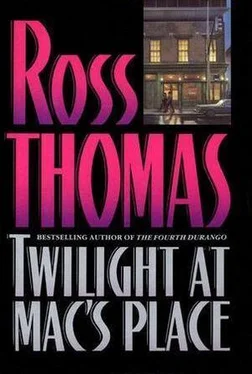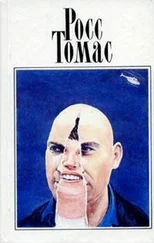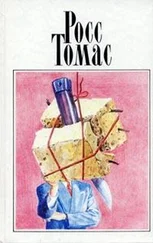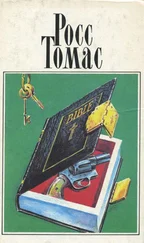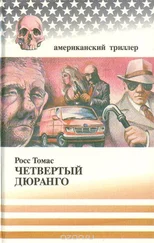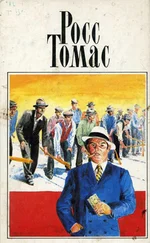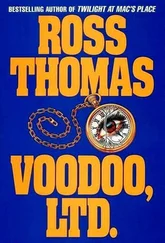“God, this is interesting,” said Erika McCorkle.
Exactly ten minutes after Haynes had hung up the telephone, there was a soft knock at the door. He opened it to admit the courtly Hamilton Keyes, carrying a gabardine topcoat and still wearing his old tweed jacket, corduroy pants, pink shirt and ancient loafers.
Once inside, Keyes’s glance flickered past Erika McCorkle to inventory the room itself, noting the wheeled table, the female clothing draped carelessly over a wingback chair, the bucket of melting ice, the half-full glasses and the two empty miniature bottles of vodka and Scotch. Done with his survey, he turned to Haynes and said, “I’m Hamilton Keyes. I knew your father.”
After a nod from Haynes that was mere acknowledgment and nothing more, Keyes turned to Erika McCorkle, who still sat cross-legged on the bed, obviously engrossed in her puzzle. “I also know your father slightly, Miss McCorkle.”
“How nice,” she said without looking up.
“Have a chair,” Haynes said, wondering how Hamilton Keyes had managed to identify Erika so quickly.
The courtly man chose the chair draped with female clothing. He picked it up, a piece at a time, placed it on top of the mini-refrigerator, sat down, topcoat in his lap, and said, “As I mentioned, I also know Michael Padillo.”
Haynes was now leaning his rear against the sill of the window that overlooked Fourteenth Street. “Who else?”
“Quite a few people across the street in the National Press Building — many of whom, I’m afraid, keep binoculars in their desk drawers.”
Realizing he had just been given a polite, if oblique, reply to his unasked question about how Erika McCorkle had been so quickly identified, Haynes abandoned the windowsill, drew the curtains, crossed to the writing desk and leaned against that.
“Tell me,” he said. “Are you the guy who can say yes or no?”
“I am, providing you’re the guy who has something to sell.”
“Steady left his memoirs to me in his will. The copyright to them anyhow.”
“Have you read the manuscript?”
“Some of it.”
“And do you still think it might make a motion picture?”
“All-American boy — Steady, of course — turns badass mercenary agent. That’s one film they won’t have to clutter up with a lot of boring cold-war spy crap.”
“But surely not yet another dreary motion picture with no hero?”
“There’ll be a hero: Steady’s kid, the overeducated, ex-L.A. homicide cop who backtracks Steady’s life while hunting down whoever killed his old man’s two best friends. And if Steady and Undean weren’t really all that friendly, well, we can fudge it a little.”
“I presume you’d play both Steady and yourself?”
“My catapult to stardom.”
“Well, I must say you do resemble him — in more than one respect.” Keyes looked away and rested his eyes on Erika McCorkle. He was still looking at her when he said, “How much?”
“The same price I quoted Undean,” said Haynes. “Seven hundred and fifty thousand.”
“A very respectable sum,” Keyes said, now looking at Haynes.
“For a very hot property. It’s so hot that Steady wasn’t three hours in his grave before somebody was offering me a hundred thousand for it.”
“Which you rejected?”
“Yes.”
“And demanded how much instead?”
“Half a million.”
“And what was the reaction to your counterproposal?”
“They said they’d get back to me tomorrow.”
“They?”
“They.”
“And if they do offer you five hundred thousand?”
“I’ll tell them I’ve since been offered seven hundred and fifty thousand,” said Haynes with the charming smile that made him so resemble his dead father. “I have been offered seven fifty, haven’t I, Mr. Keyes?”
“Yes. Providing I have last refusal.”
“The right to top any bid, whatever it is?”
Keyes nodded.
“Okay,” Haynes said. “You have it.”
“What precisely am I buying?” Keyes asked. “And please be specific.”
“World rights to everything. No exclusions. Full copyright. Which means nobody can legally use a word of it without your permission.”
“How many Xerox copies are floating around?”
“No idea.”
“Who’ll conduct the bidding?”
“Howard Mott, Steady’s lawyer and now mine.”
“How?”
“By phone, I suppose.”
“Oh,” Keyes said, sounding less than pleased.
“You want everybody in the same room?”
“I’d have no objection.”
“They might.”
“Very well, by phone then,” Keyes said. “What about payment?”
“What d’you suggest?”
“It can be deposited in any currency you choose in virtually any bank in the world.”
“The IRS wouldn’t like that, so make it a certified U.S. dollars check.”
“Then you intend to pay taxes on it,” Keyes said.
“Disappointed?”
“Not in the least. It means we’ll be getting some of it back.” Keyes rose and handed Haynes a card. “Please ask Mr. Mott to call me at my home number once the bidding arrangements are completed.”
“Okay.”
Keyes went to the door, turned back and, nodding farewell to each in turn, said, “Mr. Haynes. Miss McCorkle.”
Erika McCorkle looked up from her crossword puzzle. “What’s a five-letter word for blackguard that begins with a k ?”
“I tried ‘knave’ this morning,” said Hamilton Keyes. “And it worked quite nicely.” He opened the door and left, closing it softly behind him.
Rumor insisted that it all began on a gloomy Bay of Pigs Sunday afternoon in 1961 when two depressed mid-level CIA careerists left the Old Executive Office Building next to the White House and, desperate for drink, wandered by chance into a dingy bar-cafe hard by the now demolished Roger Smith Hotel at Eighteenth and Pennsylvania.
Once inside, the careerists were pleasantly surprised to discover they could buy coffee cups of Scotch whisky in direct violation of the District of Columbia’s since-repealed Sunday prohibition law. It was shortly after this discovery that members of the capital’s intelligence and freebooter community made the scofflaw bar their unofficial rendezvous. They continued to drink, if not eat, there for nearly fourteen years until that day in 1975 when the last helicopter lifted off the roof of the U.S. embassy in Saigon.
The next day, as if compelled by some migratory instinct, they abandoned the bar back of the Roger Smith and trekked a few blocks farther west out Pennsylvania Avenue to another gin mill not quite opposite the now vanished Circle Theatre. And it was here, in what was always called “the new joint,” that five years later they held their notorious eighteen-hour-long postmortem on the botched U.S. hostage rescue mission that had ended with death and, some claimed, dishonor in a Persian desert.
It turned out to be less of a postmortem than a verbal brawl that began around noon and was still raging at 5:57 the next morning when Metropolitan Police, summoned by shouts, yells, oaths and the sound of breaking glass, arrived, closed the new joint down and sent everyone home in taxis.
A week after the disastrous postmortem session, they migrated yet again, this time far, far out Wisconsin Avenue, almost to the Maryland state line, where scouts had discovered a nearly bankrupt Thai restaurant called Pong’s Palace that was located in a strip mall and offered the four prime requisites: a valid liquor license, few customers, bad food and ample parking. Two weeks later, by silent acclamation, Pong’s Palace was elected to serve as the third unofficial sub-rosa watering hole.
The dark green seventeen-year-old Mercedes 280 SL turned into a parking space three doors up from Pong’s and came to a stop in front of Naughty Marietta’s XXX Video Shoppe. After the car’s engine was cut and its lights switched off, the driver’s door opened and Michael Padillo got out. McCorkle emerged from the passenger side a moment later. When they reached the entrance to Pong’s Palace, Padillo went in first.
Читать дальше
